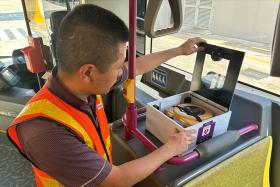Move to license bike-sharing to curb illegal parking problem
Under proposed changes, operators must be licensed, with their fleet size to be reviewed every six months
The problem of indiscriminately parked shared bicycles could soon be a thing of the past, after the Parking Places (Amendment) Bill was tabled in Parliament yesterday.
With the proposed changes, operators of dockless shared devices, including shared bikes such as oBike, Mobike and ofo, will come under a licensing regime under the Land Transport Authority (LTA).
LTA will determine the operator's fleet size by limiting how many devices the operator can have. This limit will be reviewed every six months, based on how well operators can manage illegal parking and how efficient their fleet is.
Their ability to increase fleets will also be subject to demand, the operator's track record to meet licence conditions and the availability of parking spaces nationwide.
It is estimated there are currently 100,000 dockless shared bicycles here. Only half of them are in active use.
LTA said in a statement yesterday that bike-sharing is still causing "significant social disamenities" despite its efforts to increase parking spaces and encourage bike-sharing operators to be responsible.
It will start accepting applications for licences in mid-2018, and aims to issue them by the end of the year.
Unlicensed operators can be fined up to $10,000 and/or jailed for up to six months.
LTA will also have more muscle to ensure operators curb the illegal parking problem.
Operators will have to share data with LTA, including the location of each bicycle. This will enable LTA to take action against operators with illegally parked bikes.
Those who do not meet LTA's standards will face stiff penalties, such as a fine of up to $100,000, a reduction of their fleet size, and even have their licences suspended or cancelled.
From the second half of this year, LTA will also be installing unique QR codes at all public bicycle parking areas. Operators must ensure users scan these codes before ending their trip.
Actions will also be taken against users who flout the rules. Those who repeatedly park illegally will be banned from all device-sharing services temporarily. They can also be continuously charged by operators for the time that they have illegally parked.
Mobike and ofo told The New Paper that they are in favour of the changes.
Mr Christopher Hilton, ofo's head of policy and communications in South-east Asia, said it will work with LTA and other partners to ensure that its bikes are used "respectfully" and in a way that "maintains the cleanliness and order of the environment in Singapore".
Mobike Singapore's country manager Sharon Meng said: "We appreciate LTA's support of bike-sharing... and we are in favour of developing a healthy market environment."
She added that Mobike has continually shared data and analytics with LTA.
But oBike Singapore's general manager Tim Phang told TNP: "While we welcome guidelines by the authorities, the move to introduce licensing regimes instead of educating users places a heavy burden on start-ups, which in turn means that bike-sharing users will suffer. This will mean that existing public and private transport options will be forced to capacity and put the brakes on moving Singapore towards a car-lite future."
Transport economist Walter Theseira from the Singapore University of Social Sciences said operators have been increasing their fleet quickly because, to them, it is the "best and cheapest" way to expand.
But doing this has led to current parking problems.
"With these changes, operators have to run their bikes competitively and nurture consumer behaviour before they can expand. Just adding more bikes will not be the solution," he said. And once this option is taken away, operators could run into issues in growing their business as they might not be prepared or equipped to find innovative solutions to expand in other ways, Dr Theseira added.
Get The New Paper on your phone with the free TNP app. Download from the Apple App Store or Google Play Store now



